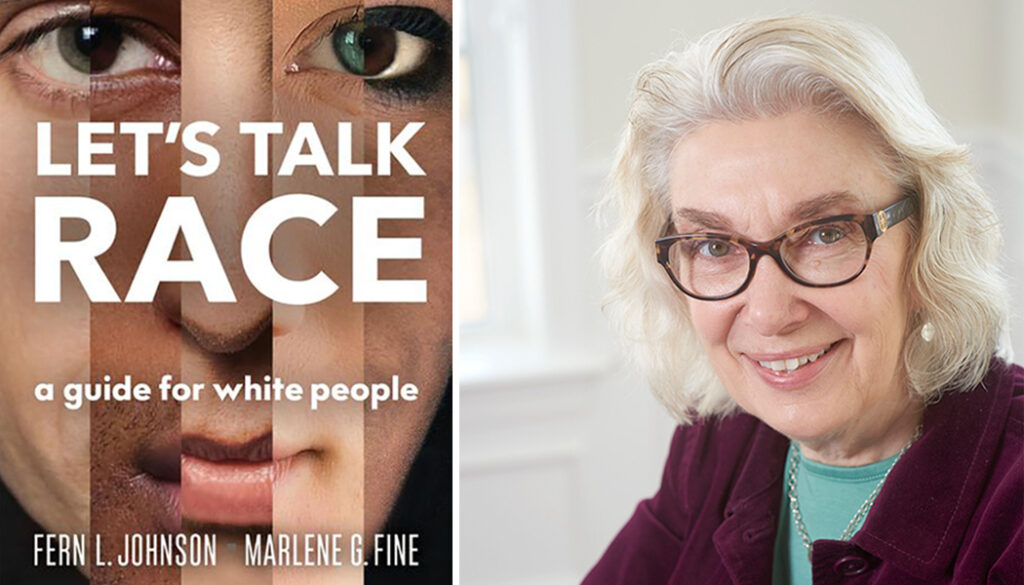Professor Fern Johnson publishes ‘Let’s Talk Race,’ an essential guide for difficult conversations

As the trial of Derek Chauvin unfolds and news reports the death of yet another unarmed Black man shot and killed by police near Minneapolis, there has never been a more urgent need for honest dialogue around race in America. A new resource to help facilitate these difficult but necessary conversations is available this week.
“Let’s Talk Race: A Guide for White People,” by Fern L. Johnson, senior research scholar and professor emerita of English at Clark University, and Marlene G. Fine, professor emerita at Simmons University, provides a critical framework for conversations about race. The book confronts why white people struggle to talk about race, why we need to own this problem, and how we can learn to do the work ourselves and stop expecting Black people to do it for us.
Written by two specialists in race relations and parents of two adopted African American sons, the book provides personal insights and practical guidance and is illustrated with examples, anecdotes, research findings and prompts for personal reflection and conversations about race. Professors Fine and Johnson draw upon their own insight born from decades of conversations and encourage readers to begin talking about race. They include advice on how to find conversational partners and provide constructive suggestions for having conversations on the topic.
The book describes the types of racism (interpersonal, institutional/structural, and internalized), explores the implications of normalizing and privileging whiteness, provides a historical context for understanding present-day racial disparities, and includes African American cultural practices often misunderstood by whites.
Professor Johnson, who grew up in Brooklyn Center, Minnesota — where the recent police killing of Daunte Wright occurred — wrote that after the George Floyd murder, she was “profoundly sad and ragingly angry for both what happened and my ignorance for such a very long time.” The authors urge readers to take the conversation seriously, to educate themselves about Black history and its impact on Black lives today, and to challenge non-Blacks to own their responsibility in dismantling the systemic force of racism in America.
“People of color are beyond aware and are experiencing racial fatigue after a lifetime and decades of attempting to educate peers, colleagues, friends, and strangers about the reality of racism and its impact on every aspect of our daily lives,” writes Tina M. Harris, who holds the Manship-Maynard Endowed Chair of Race, Media, and Cultural Literacy at Louisiana State University.
Emmett G. Price III, executive director of the Institute for the Study of the Black Christian Experience at the Gordon Conwell Theological Seminary, calls the book “a charge to engage in genuine conversation” that is “candidly honest and brilliantly transparent.”
Emphasizing the importance of conversations about race, George Yancy, Samuel Chandler Dobbs Professor of Philosophy at Emory University, offers this praise: “With a call for fearless speech and courageous listening, the authors of this demanding and yet inviting book refuse to be complicit with white silence, apathy, and ignorance.”
Brookline Booksmith will host a Zoom launch event for “Let’s Talk Race” on Wednesday, April 14, at 7 p.m. EDT. The event will feature Johnson and Fine in conversation with Lisa Mullins, lead host at WBUR’s “All Things Considered.” Register here for the event.
Professor Johnson joined the faculty at Clark University in 1988. She specializes in the study of race, ethnicity, and gender in discourse; her scholarship focuses on race and gender in language use, language policy in multilingual societies, and the interrelations of language and culture. She is also the author of “The Interracial Adoption Option: Creating a Family Across Race” (2013), “Imaging in Advertising: Verbal and Visual Codes of Commerce” (2007), and “Speaking Culturally: Language Diversity in the United States” (2000).


